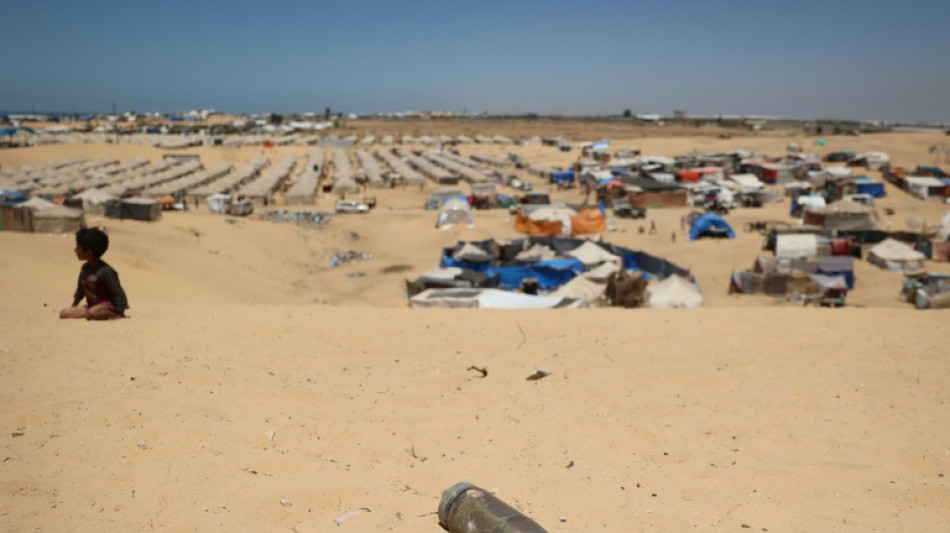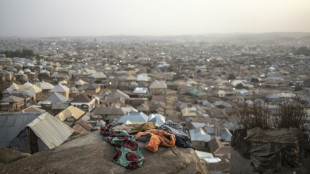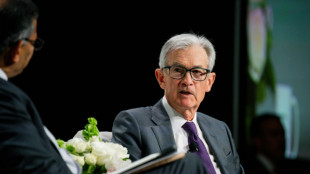
-
 Australia's Mary Fowler set for long lay-off after ACL injury
Australia's Mary Fowler set for long lay-off after ACL injury
-
Rubio to meet French leaders for talks on Ukraine

-
 Webb spots strongest 'hints' yet of life on distant planet
Webb spots strongest 'hints' yet of life on distant planet
-
Arteta's Arsenal come of age with Madrid masterclass

-
 None spared in Nigeria gun, machete massacre: survivors
None spared in Nigeria gun, machete massacre: survivors
-
'No problem' if Real Madrid replace me: Ancelotti

-
 Inter dreaming of treble glory after reaching Champions League semis
Inter dreaming of treble glory after reaching Champions League semis
-
'No limits' for treble-hunting Inter, says Pavard

-
 Inter off Bayern to reach Champions League last four
Inter off Bayern to reach Champions League last four
-
Rice 'knew' Arsenal would dethrone Real Madrid

-
 US stocks fall with dollar as Powell warns on tariffs
US stocks fall with dollar as Powell warns on tariffs
-
Arsenal oust holders Real Madrid to reach Champions League semis

-
 Arsenal defeat Real Madrid to reach Champions League semis
Arsenal defeat Real Madrid to reach Champions League semis
-
AMD says US rule on chips to China could cost it $800 mn

-
 Inter hold off Bayern to reach Champions League last four
Inter hold off Bayern to reach Champions League last four
-
El Salvador rejects US senator's plea to free wrongly deported migrant

-
 Newcastle thrash Crystal Palace to go third in Premier League
Newcastle thrash Crystal Palace to go third in Premier League
-
Zuckerberg denies Meta bought rivals to conquer them

-
 Starc stars as Delhi beat Rajasthan in Super Over
Starc stars as Delhi beat Rajasthan in Super Over
-
Weinstein asks to sleep in hospital, citing prison 'mistreatment'

-
 Amorim asks McIlroy to bring Masters magic to Man Utd
Amorim asks McIlroy to bring Masters magic to Man Utd
-
Ruud keeps Barcelona Open defence on course

-
 Trump tariffs could put US Fed in a bind, Powell warns
Trump tariffs could put US Fed in a bind, Powell warns
-
CONCACAF chief rejects 64-team World Cup plan for 2030

-
 Putin praises Musk, compares him to Soviet space hero
Putin praises Musk, compares him to Soviet space hero
-
Son to miss Spurs' Europa League trip to Frankfurt

-
 US senator in El Salvador seeking release of wrongly deported migrant
US senator in El Salvador seeking release of wrongly deported migrant
-
Trump tariffs could put the US Fed in a bind, Powell warns

-
 US judge says 'probable cause' to hold Trump admin in contempt
US judge says 'probable cause' to hold Trump admin in contempt
-
India opposition slams graft charges against Gandhis

-
 Nate Bargatze to host Emmys: organizers
Nate Bargatze to host Emmys: organizers
-
US Fed Chair warns of 'tension' between employment, inflation goals

-
 Trump touts trade talks, China calls out tariff 'blackmail'
Trump touts trade talks, China calls out tariff 'blackmail'
-
US judge says 'probable cause' to hold govt in contempt over deportations

-
 US eliminates unit countering foreign disinformation
US eliminates unit countering foreign disinformation
-
Germany sees 'worrying' record dry spell in early 2025

-
 Israel says 30 percent of Gaza turned into buffer zone
Israel says 30 percent of Gaza turned into buffer zone
-
TikTok tests letting users add informative 'Footnotes'

-
 Global uncertainty will 'certainly' hit growth: World Bank president
Global uncertainty will 'certainly' hit growth: World Bank president
-
EU lists seven 'safe' countries of origin, tightening asylum rules

-
 Chelsea fans must 'trust' the process despite blip, says Maresca
Chelsea fans must 'trust' the process despite blip, says Maresca
-
Rebel rival government in Sudan 'not the answer': UK

-
 Prague zoo breeds near-extinct Brazilian mergansers
Prague zoo breeds near-extinct Brazilian mergansers
-
Macron to meet Rubio, Witkoff amid transatlantic tensions

-
 WTO chief says 'very concerned' as tariffs cut into global trade
WTO chief says 'very concerned' as tariffs cut into global trade
-
Sports bodies have 'no excuses' on trans rules after court ruling: campaigners

-
 Zverev joins Shelton in Munich ATP quarters
Zverev joins Shelton in Munich ATP quarters
-
The Trump adviser who wants to rewrite the global financial system

-
 US senator travels to El Salvador over wrongly deported migrant
US senator travels to El Salvador over wrongly deported migrant
-
UN watchdog chief says Iran 'not far' from nuclear bomb


Shiny and deadly, unexploded munitions a threat to Gaza children
War has left Gaza littered with unexploded bombs that will take years to clear, with children drawn to metal casings maimed or even killed when they try to pick them up, a demining expert said.
Nicholas Orr, a former UK military deminer, told AFP after a mission to the war-battered Palestinian territory that "we're losing two people a day to UXO (unexploded ordnance) at the moment."
According to Orr, most of the casualties are children out of school desperate for something to do, searching through the rubble of bombed-out buildings sometimes for lack of better playthings.
"They're bored, they're running around, they find something curious, they play with it, and that's the end," he said.
Among the victims was 15-year-old Ahmed Azzam, who lost his leg to an explosive left in the rubble as he returned to his home in the southern city of Rafah after months of displacement.
"We were inspecting the remains of our home and there was a suspicious object in the rubble," Azzam told AFP.
"I didn't know it was explosive, but suddenly it detonated," he said, causing "severe wounds to both my legs, which led to the amputation of one of them."
He was one of hundreds of thousands of Palestinians returning home during a truce that brought short-lived calm to Gaza after more than 15 months of war, before Israel resumed its bombardment and military operations last month.
For Azzam and other children, the return was marred by the dangers of leftover explosives.
- 'Attractive to kids' -
Demining expert Orr, who was in Gaza for charity Handicap International, said that while no one is safe from the threat posed by unexploded munitions, children are especially vulnerable.
Some ordnance is like "gold to look at, so they're quite attractive to kids", he said.
"You pick that up and that detonates. That's you and your family gone, and the rest of your building."
Another common scenario involved people back from displacement, said Orr, giving an example of "a father of a family who's moved back to his home to reclaim his life, and finds that there's UXO in his garden".
"So he tries to help himself and help his family by moving the UXO, and there's an accident."
With fighting ongoing and humanitarian access limited, little data is available, but in January the UN Mine Action Service said that "between five and 10 percent" of weapons fired into Gaza failed to detonate.
It could take 14 years to make the coastal territory safe from unexploded bombs, the UN agency said.
Alexandra Saieh, head of advocacy for Save The Children, said unexploded ordnance is a common sight in the Gaza Strip, where her charity operates.
"When our teams go on field they see UXOs all the time. Gaza is littered with them," she said.
- 'Numbers game' -
For children who lose limbs from blasts, "the situation is catastrophic", said Saieh, because "child amputees require specialised long-term care... that's just not available in Gaza".
In early March, just before the ceasefire collapsed, Israel blocked all aid from entering Gaza. That included prosthetics that could have helped avoid long-term mobility loss, Saieh said.
Unexploded ordnance comes in various forms, Orr said. In Gaza's north, where ground battles raged for months, there are things like "mortars, grenades, and a lot of bullets".
In Rafah, where air strikes were more intense than ground combat, "it's artillery projectiles, it's airdrop projectiles", which can often weigh dozens of kilograms, he added.
Orr said he was unable to obtain permission to conduct bomb disposal in Gaza, as Israeli aerial surveillance could have mistaken him for a militant attempting to repurpose unexploded ordnance into weapons.
He also said that while awareness-raising could help Gazans manage the threat, the message doesn't always travel fast enough.
"People see each other moving it and think, 'Oh, they've done it, I can get away with it,'" Orr said, warning that it was difficult for a layperson to know which bombs might still explode, insisting it was not worth the risk.
"You're just playing against the odds, it's a numbers game."
I.Stoeckli--VB
